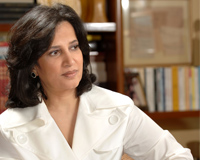Contact Center
.
29 April 2014
Minister of Culture Participates at the 3rd Arab-South American Ministerial Meeting


H.E Shaikha Mai bint Mohammed Al Khalifa, Minister of Culture, took part in the 3rd meeting of the Culture Ministers of Arab and South American countries which was held in Riyadh over two days under the theme "Arab-South American Culture.. Partnership and Future". Indeed, Custodian of the Two Holy Mosques King Abdullah bin Abdulaziz Al Saud delegated Saudi Crown Prince, Second Deputy Prime Minister and his Personal Advisor and Envoy Prince Muqrin bin Abdulaziz Al Saud to patronise the opening ceremony.
The three -day meeting is due to discuss topics dealing with the Arab-Islamic civilization in South America countries and its role in building bridges of dialogue “ the future of the Arab - South American cultural dialogue” During the meeting, the participants are scheduled to issue a number of recommendations emphasizing the need to consolidate cultural cooperation and dialogue between the Arab and South American countries.
Participants discussed cultural projects between Arab and South America countries, which included arts, theater, publications, and museums, in addition to supporting Arab League and international organizations in South America. Discussion also focused on Arab-South America dialogue, Arab and Islamic civilizations in South America and their role in improving dialogue between them. In addition, ministers demanded more support from the Arab League and international organizations in South America, and focused on the dialog between regions and the organization's role in improving communication between Arab and Muslim civilizations. Culture Ministers and other authorities from South American and Arab countries gathered at the third ministerial South America-Arab Countries Summit today in Riyadh issued a statement in favor of increased cooperation in the fields of arts, theater, museums and publications.
Program Director of Culture & Heritage Preservation in Alesco, Ms. Hayet Guettat- said that Arab states and Latin American countries have many things in common, such as the importance of holding continuous dialogue and exchange of expertise, constructive cooperation, which would contribute to geographical balance for the good of both sides.
Ms. Hayet Guettat said that Alecso supports a three-year plan to increase higher education cooperation between 12 South American and 22 Arab countries is to start next year. The aim is to improve the quality of education in both regions, enhance cooperation and exchange of experience, and build an educational and scientific database. A special data network will be set up to exchange expertise and promote information about educational policies in the participating countries. It calls for building cultural and educational bridges between Arab nations and people of South American countries through teaching languages at academic institutions. Centres for teaching Spanish and Portuguese at universities in Arab countries and identical institutions in South America to teach Arabic will be established. Other developments planned include an e-network for exchanging expertise and applying modern information technology in teaching the Arabic, Portuguese and Spanish languages, involving the private sector, and special linguistic programmes for translating Arabic publications into Spanish and Portuguese.
With the help of heads of universities in the two regions, a network and directory of Arab, Spanish and Portuguese language studies centres, which would list institutions from the two regions, will be created, She said.
Arab League Director of Culture and Dialogue of Civilizations, Mohammad Al-Sofi, presented a working paper about Arab and South American cooperation, in which he addressed fundamental elements for the creation of a sustainable cultural bridge between both communities. Arab League Director of Culture and Dialogue of Civilizations Dr. Mohammad Al-Sofi presented a working paper about "Arab and South America future cooperation," which covered vital issues on building the most suitable cultural relations between Arab and countries in South America.
At both meetings, participants promoted political coordination and improved cooperation mechanisms in areas of economy, culture, education, science and technology, environmental conservation, tourism and others.
Discussions focused on cultural issues, including joint projects between the Arab and South American countries. The audience also spotlighted the Arab-South American dialogue as well as the Arab and Islamic civilisation in South America and its role in laying bridges of communication.







